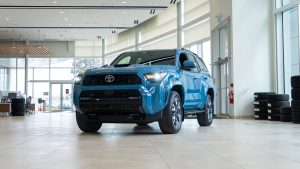When purchasing a vehicle, it’s easy to focus on the up-front purchase price, but there’s much more to consider. The total cost of ownership (TCO) is an estimate of all the expenses associated with owning a vehicle over time. Let’s go over what total cost of ownership is and how to estimate it for your next vehicle purchase!
What is Total Cost of Ownership?
The total cost of ownership includes all the costs of operating and maintaining a vehicle throughout its lifetime. This includes:
- Purchase price (or lease payments)
- Insurance premiums
- Fuel or charging costs
- Maintenance and repairs
- Depreciation
- Registration and licensing fees
TCO is essential to consider because it provides a more comprehensive picture of the financial commitment involved in vehicle ownership. By understanding the full scope of costs, you can choose a vehicle that truly aligns with your budget and avoid financial surprises down the road.
Estimating the Total Cost of Ownership
By combining all the factors listed below, you can estimate the total cost of owning your vehicle for a set period, usually calculated over 5-10 years.
1. Calculate the Purchase Price or Monthly Payment
Start with the vehicle’s up-front purchase price or your estimated monthly payment if you’re financing or leasing. This is your baseline cost.
Read more: Leasing Vs. Financing a Vehicle: Which is Best for You?
2. Estimate Fuel or Charging Costs
For gas vehicles, research the fuel efficiency (miles per gallon or liters per 100 kilometers) and estimate your average monthly fuel cost based on your driving habits.
For electric vehicles, calculate the cost of charging at home and public charging stations.
Read more: How Much Does It Cost to Own an Electric Vehicle Vs. Gas Vehicle?
3. Insurance Costs
Get quotes from Manitoba Public Insurance for the vehicle you’re considering, as rates vary by model, driver history, and location.
4. Consider Maintenance and Repairs
Different vehicles have different maintenance costs. Luxury or high-performance vehicles may cost more to maintain, while reliable and commonly used models may have more affordable parts and service. Consider the monthly or annual cost of ongoing maintenance such as oil changes, tire rotations, vehicle inspections, and more.
5. Calculate Depreciation
Vehicles depreciate at different rates. Luxury and high-end vehicles tend to depreciate faster than more affordable models, which impacts resale value. Research your chosen vehicle’s depreciation rate to understand how much its value will decrease over time.
6. Registration and Licensing Fees
These vary by location but are necessary to legally operate your vehicle.
7. Additional Costs
If you live in an area with paid parking, or have other vehicle-related expenses, be sure to factor them into your TCO.
Using the CAA Driving Cost Calculator to Estimate Costs
To simplify this process, the CAA Driving Cost Calculator is a valuable tool to estimate the ongoing costs of owning a specific vehicle. This online tool allows you to enter details such as your province, the vehicle model and year, and estimated annual mileage. It then calculates a realistic TCO based on average maintenance costs, fuel or charging expenses, insurance, and depreciation for that specific model, allowing you to see if it will fit in your budget.
The calculator provides a breakdown of annual or monthly expenses, giving you a clearer picture of your financial commitment. The CAA Driving Cost Calculator is great for comparing the TCO of several vehicle models, allowing you to find the one that is ideal for you.
For example, let’s look at the annual cost of owning a 2024 Toyota RAV4 XLE assuming annual mileage of 20,000km and owning the vehicle for 5 years.



The total annual cost of owning a 2024 Toyota RAV4 XLE is estimated to be $10,018.27 per year.
Why Calculating TCO is Important for Your Budget
Estimating the TCO helps you choose a vehicle that aligns with your financial goals. For example, while a high-performance vehicle may have an attractive price, it might have high fuel consumption, costly maintenance, and fast depreciation. By calculating TCO, you’ll be able to make a more informed choice that considers both the initial cost and the ongoing expenses, ensuring you’re prepared for the full cost of ownership.
Read more: How to Make a Budget When Vehicle Shopping
Birchwood is here to help you through the car buying process and find a vehicle that meets your needs and budget. Remember to consider all aspects of ownership, from maintenance to insurance, so you can enjoy your vehicle with peace of mind.


